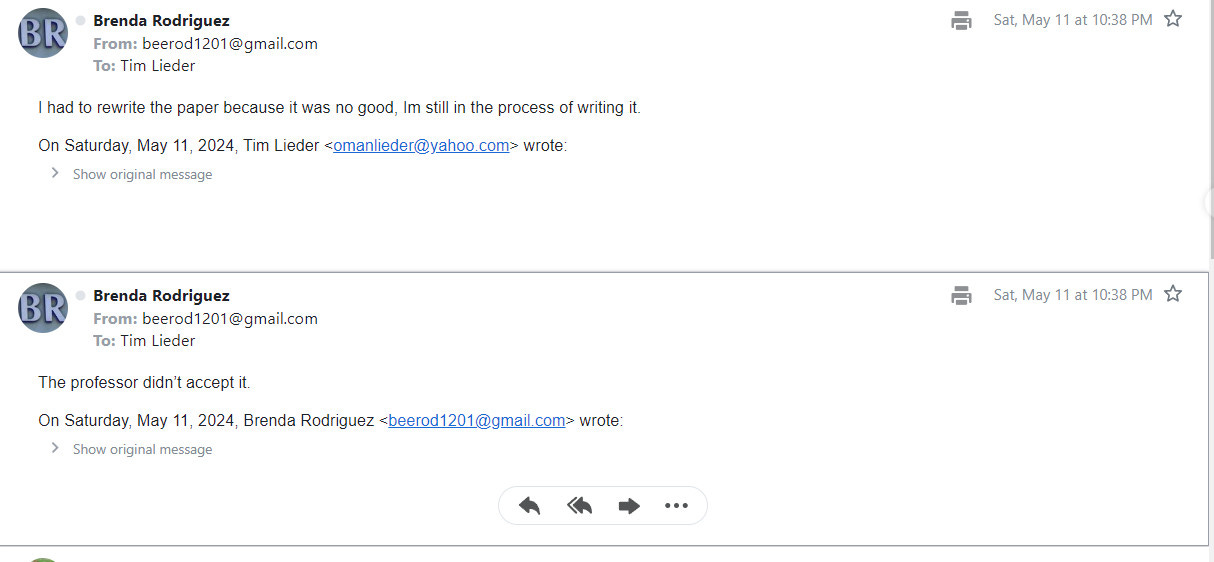Brenda Rodriguez Hires People to Write Papers and is a Deadbeat (Academic Fraud Extra)
Brenda Rodriguez doesn't pay her debts.
I already emailed everyone at RCC.edu where Brenda Rodriguez goes to school. I know Brenda Rodriguez goes to school at RCC.edu because it was on the assignment. I have been very busy with work, but I had a bad feeling about Brenda Rodriguez who lives in Riverside, CA or close to Riverside, California. Brenda Rodriguez hired me to write her paper. It was on child education or development. So don’t let Brenda Rodriguez watch your kids. I’m not saying that she’ll let them fall off the balcony like Eric Clapton, but she might. Brenda Rodriguez (beerod1201@gmail.com) is a lying little shit who can’t even write her own paper. Sadly, I don’t know which Brenda Rodriguez is the Brenda Rodriguez who hired me to write a paper and never paid the $125 I invoiced. Is she the one with the dead brother, the Instagram model with all the tedious butt shots? Who knows. When did Brenda become such a popular first name.
Then when I spent Thursday night and Friday afternoon writing it, Brenda Rodriguez refused to pay me. Brenda Rodriguez claimed that the professor refused to take it. So she had nothing to “loose” - which makes me think that Brenda Rodriguez (beerod1201@gmail.com) who lives near enough to Riverside Community College to attend Riverside Community College wrote a lot of semi-illiterate shit for this class and then when Brenda Rodriguez turned in the paper that she AGREED TO PAY FOR, the professor said “nah, this isn’t your paper” and so Brenda Rodriguez (beerod1201@gmail.com) decided to fuck me over, because I’m just a write and what can a writer do to Brenda Rodriguez. By the way Brenda Rodriguez is a deadbeat client who will fuck you over. Don’t hire her. Don’t agree to do a job for her. If you are dating her, she’s cheating on you. With your brother. Ok, she might not be fucking your brother, but Brenda Rodriguez is a deadbeat. I am pretty certain that Brenda Rodriguez probably doesn’t fuck her brother and she most likely isn’t a child molester. She’s just Brenda Rodriguez who hires people to write papers and doesn’t pay.
By the way, this is the picture for the RCC theater department. I think it’s cool. Good job guys (I did add everyone from RCC to this substack in order to learn good things about their student Brenda Rodriguez. Sorry head of the Welding Department. I suppose you don’t care. But this dragon is cool. We never had at that at my college. Would have improved my high school production of Our Town (Our Town is such a boring play - probably not as boring as Brenda Rodriguez)
I also can’t say with any certainty that Brenda Rodriguez is a lousy lay. She might be. But that’s not what this article is about.
Ok. Now that I’ve SEO’d all over Brenda Rodriguez here’s the paper I wrote for Brenda Rodriguez.
Introduction
One of the most long lasting controversies is childhood development is spanking. Spanking is the act of slapping a child on the bottom in a way that hurts slightly but mostly humiliates and lets the child know that they are misbehaving. For some, this is a harmless act that disciplines without causing damaging, something that adults pay for in the more discerning clubs. For others, this is child abuse and should never be employed against any child ever. In this paper, I will discuss the arguments in favor of and against spanking.
Pro-Spanking Arguments
There are two major arguments in favor of spanking. The first is that spanking is disciplined and children need to be disciplined. Often we see an incorrigible adult and think that someone should have spanked them when they were children. Or we see children running around screaming while their parents threaten to put them in “time out.” Only their parents never put them in time out and they continue to scream.
When it comes to attachment theory, there are some who argue that spanking does not control behavior. In fact, it makes behavior worse. However, we can dispute several the arguments against spanking as beliefs more than researched outcomes. According to some “the experience of being spanked and thus physically hurt by their parents can interfere with children’s closeness to and trust of their parents, which in turn undermines parents’ socialization messages about appropriate behavior” (Gershoff et al 2018, p. 110). However, this negative socialization tends to be more theoretical than actual. People with distant relationships with their parents have upbringings that range from abusive to perfectly cordial without corporal punishment. Furthermore, there are many who have close relationships with their parents who do not see spanking as distancing. In many ways, the spanking is not as important as the rationales for spanking and the context of the spanking.
An argument for spanking is the acceptance of spanking as a form of punishment of those who had been spanked as children. “Adolescents who had been spanked by their mothers were more accepting of it than other adolescents” (Afifi et al 2022, p. 3) This is not the same story when it comes to child. People who grew up being punched or kicked or severely beaten when they were children do think of that as a positive part of their childhoods. In fact, they either do everything they can to prevent repeating that behavior or they feel shame when they beat their own children.
Adolescents and adults who were spanked as children are generally fine with spanking. They are not fine with beating or verbal abuse. They certainly don't wish that their parents had killed them. Whatever their relationship with their parents, spanking was not a negative factor.
The second argument in favor of spanking is cultural. Not every culture views spanking as child abuse. More importantly, parents who spank their children should not be placed in the same category as parents who try to drown their children in the bathtub or parents who chain their children to radiators whenever company comes over. There is a great deal of literature that assumes that spanking is just as bad as physical violence (hitting, punching, breaking arms, etc.)
Trevor Noah has a comedy routine about how a school in Africa promised Oprah Winfrey that they wouldn't spank their students. And then turned around and continued to beat their students because spanking is a cute little act and the students need way more punishment if they are ever going to behave.
This might actually be an argument against spanking since people who accept spanking as a corporal punishment may see it as a small punishment on the way to greater punishments. Even as spanking is a common form of punishment, there's a great deal of evidence that really doesn't bear out when it comes to negative outcomes.
For example, one study on spanking tried to draw a correlation between spanking and socioeconomic development. “Results from multilevel models show that reports of spanking of children in the household were associated with lower scores on a 3-item socioemotional development index among 3- and 4-year-old children. Country-level results from the multilevel model showed 59 countries (95%) had a negative relationship between spanking and socioemotional development and 3 countries (5%) had a null relationship. Spanking was not associated with higher socioemotional development for children in any country.” (Pace et al 2019). Again we have a scale of socio-emotional development that was put forth by a wealthy “first world” privilege and applied to poorer nations.
Again, correlation and causation are too far apart to truly give an argument. There are many reasons why a child who grows up in a lower to middle income country would have poor coping skills including poverty, discrimination, exploitation
Anti-Spanking Arguments
One of the first arguments against spanking is the moral argument. For many, there is no moral justification for hitting a child no matter the context. This argument posits that any arguments about hitting a child from love or discipline are specious and self-serving. Many of the research studies associated with spanking take it as a shared assumption that spanking is harmful.
Often the studies will associate spanking with maltreatment including sexual and verbal abuse. “Child maltreatment has been consistently associated with a broad range of mental health problems, including depression or depressed mood, personality disorders, suicidal ideation and/or attempts, and substance use in adulthood. Similarly, numerous studies over the past 20 years have also found spanking to be associated with similar mental health problems in childhood and adulthood, including depression or depressed mood” (Afifi 2017, p. 25). One notices that the biases related to spanking are strong and Tracie O. Afifi who spearheaded this study also has cited many studies that she also made.
This seems like bad scholarship. These scholars are not starting with hypotheses and then testing them. They are starting with theories and then trying to make the scholarship fit their theories. So in the case of Afifi, she is trying to make a correlation between spanking and depressive health outcomes including suicidal ideation. However, she is also giving a great deal of information based on the fact that other childhood problems such as sexual abuse and domestic violence. Even when she finds a fact that might be a positive in relation to spanking such as adolescents having a positive attitude towards spanking, she's still trying to frame it as a negative.
This is not to say that spanking is great. There are plenty of adults who swear by it and we've all dated people who wanted to be spanked because it turns them on. The current Trump trial shows that Trump liked to be spanked, an image that no one wants in their head. However, spanking children is going to be problematic because it's shaming a child with a mild pain in order to make the child behave.
For some people, especially people of privilege who were raised by their nannies, spanking is a great evil that disgusts them. They are going to hate spanking no matter what. They probably have a point. Also no child wants to be spanked. They might later feel like it was ultimately a positive experience, especially in adolescence when their parents are not able to spank them, but they aren't happy with the experience when it's happening.
This brings us to the practical consideration. In this case, the discipline nature of spanking is counterproductive. “research to date has consistently found that spanking is linked with more externalizing behavior problems, such as aggression and conduct disorder.” (Gershoff et al, 2018, p. 110). Granted, correlation is not causation and an argument could be made that the externalizing behavior is causing the spanking and not vice versa.
Furthermore, “ACEs did not moderate the link between spanking and externalizing behavior, indicating that spanking worsens externalizing behavior regardless of exposure to other adversities.” (Ma et al 2021, p. 174). Of course, we also have to consider the question of whether the causation goes one way or the other. Do children who are spanked act out more or do children who are misbehaving get spanked more often?
The possibility that spanking leads to more behavior problems is always going to be an issue. We can say that spanking doesn't help, but we are not sure and the findings are largely inconclusive.
Conclusion
Whether or not spanking causes more behavior problems tends to be secondary to the notion that spanking is always wrong. In researching this paper, the author found several studies written by the same people who shared the same negative assumptions about spanking. As far as most researchers are concerned, spanking is a great evil and being spanked is going to just lead to more behavior problems. Claiming that spanking is child abuse is going to get a lot of agreement without much pushback. No one wants to be the person who states that spanking is good for children and that they spank their children, especially among people who think that spanking is automatically evil.
Overall, spanking seems to be counterproductive and not a great way to discipline, but for parents who spank their children the confusion between spanking and outright abuse seems specious at best. One probably should not spank one's children, but one should dial back the automatic condemnation of people who spank their children, as long as they only spank.
References
Afifi T.O., Ford D, Gershoff, E.T, Merrick M, Grogan-Kaylor A, Ports K.A. MacMillan H.L, Holden G.W., Taylor C.A, Lee, S.J, Bennett R.P. (2017). Spanking and adult mental health impairment: The case for the designation of spanking as an adverse childhood experience. Child Abuse & Neglect. 71: 24-31.
Afifi T.O, Salmon S, Stewart-Tufescu A, Tailileu T, Fortier J, MacMillian H, Durrant J, Holden, G.W. (2022). Associations between spanking beliefs and reported spanking among adolescents -parent/caregiver dyads in a Canadian sample. BMC Public Health 22(493). https://doi.org/10.1186/s12889-022-12856-z
Gershoff E.T., Sattler K.M.P, Ansari A. (2018). Strengthening causal estimates for links between spanking and children's externalizing behavior problems. Psychological Science 29(1): 110-120. DOI: 10.1177/0956797617729816
Ma J, Lee, S.J., Grogan-Kaylor A. (2021). Adverse childhood experiences and spanking have similar associations with early behavior problems. The Journal of Pediatrics 235.
Pace G.T, Lee S.J., Grogan-Kaylor A. (2019). Spanking and young chldren's socioemotional development in low- and middle-income countries. Child Abuse & Neglect 88: 84-95.
By the way, there are only about 5 researchers on the topic of spanking. I’d think there’d be more. Also note that I only referred to spanking as an adult kink twice in this paper. I’m proud of myself.
If you are horrified at my day job writing term papers for lazy college students like Brenda Rodriguez (beerod1201@gmail.com) and you’d like me to write more fiction, please buy Sugarplum Zombie Motherfuckers, available on Kindle and Audible (I paid that guy $600 to record it so please help me out there. He’s a great narrator)
If you’d like to see me publish more books, buy the last Dybbuk Press book - King David and the Spiders from Mars











Loved the first para for SEO . brenda sucks
I think the other commenters are FOBs.